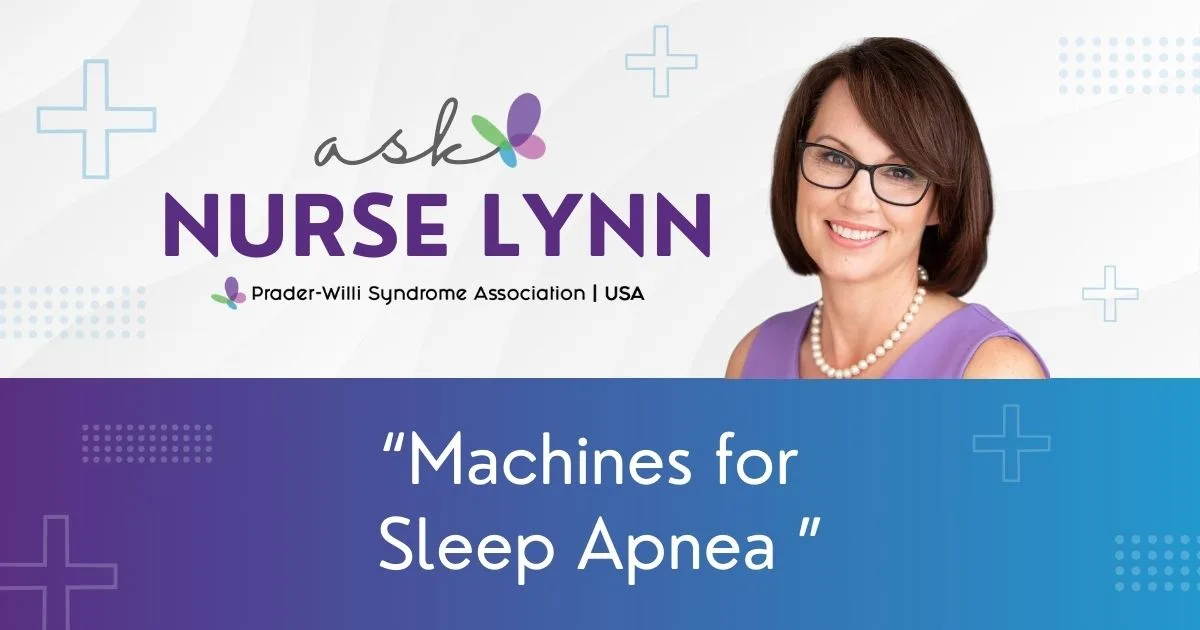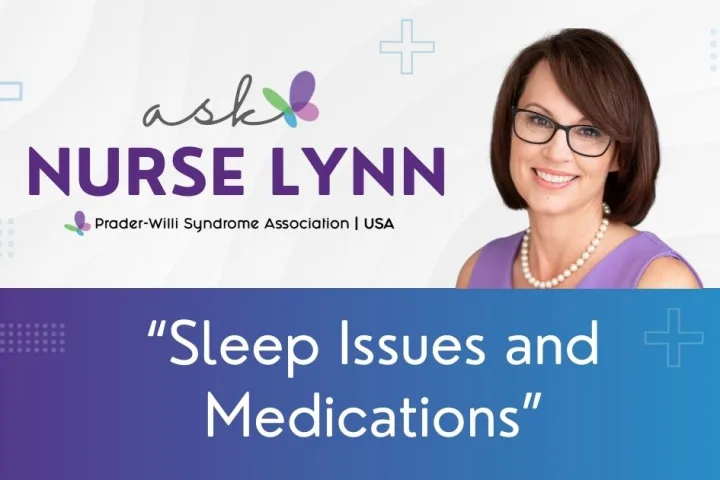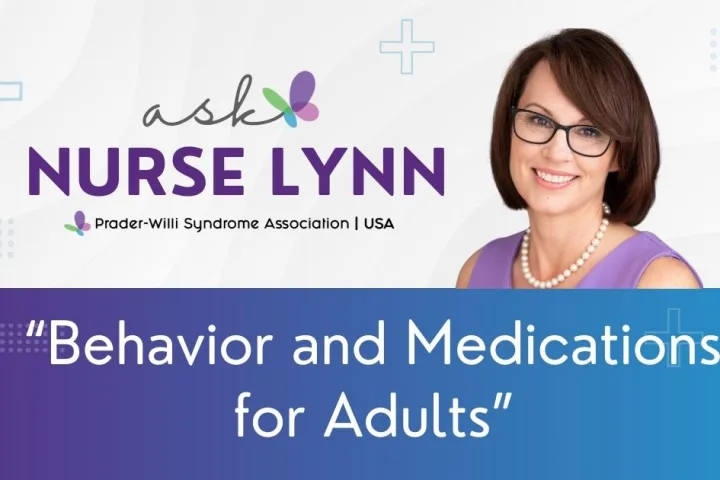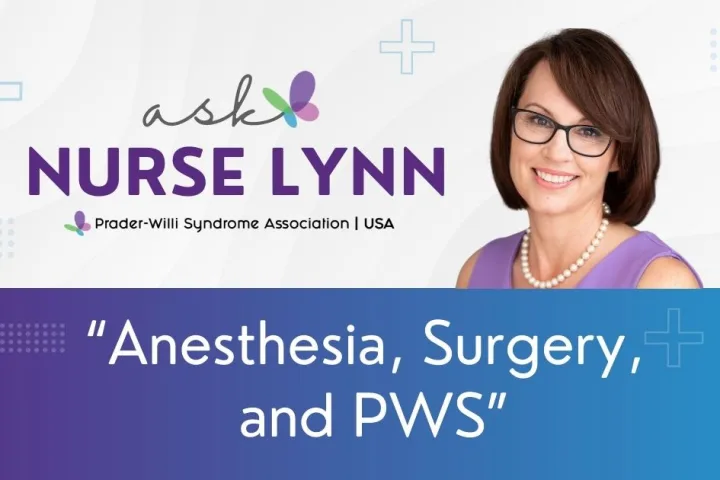Question:
Female, 37 years old, Deletion subtype
I have Prader-Willi syndrome and wanted to know what is the correct machine use for obstructive sleep apnea in people like me. I currently have a CPAP machine and just recently had a sleep study done. The doctor said I have the wrong machine and need a BiPAP machine. In order for me to get a BiPAP machine, is to go in for another sleep test to be done which I already have done last month. I asked them if I could do a home sleep study because I’m allergic to adhesive. They used adhesives when they hooked me up the machine in the sleep lab and I broke out in hives. They told me that I can’t have a home sleep study done in order for them to get measurements setting for BiPAP. Why can’t it be a home sleep test?
Nurse Lynn’s Response:
I’m sorry to hear about the challenges you’re experiencing with your sleep study and treatment. Let’s break down your situation a bit.
PWS can affect breathing patterns during sleep, and individuals with PWS are at a higher risk for OSA. While CPAP machines are commonly used to treat OSA, some individuals—like yourself—may benefit from other options. A BiPAP machine is often recommended for people who have more complex or variable breathing patterns during sleep.
A BiPAP machine might be a better fit for you because it can adjust the pressure for both inhalation and exhalation, which makes it easier to breathe out compared to a CPAP machine. This can be particularly helpful if your airway collapses or obstructs during exhalation. Unlike a CPAP, which provides a continuous level of pressure, a BiPAP offers two different pressures: one for inhalation and one for exhalation. This flexibility can make it more comfortable and effective for people who experience varying levels of airway obstruction.
Your doctor likely recommended another sleep study to determine the correct settings for the BiPAP machine. Sleep studies for BiPAP machines require precise measurements to ensure the machine provides the right level of support for your specific breathing patterns, as BiPAP machines function differently than CPAP machines.
Although home sleep studies are convenient, they may not provide the level of detailed data needed for a BiPAP machine setup. Sleep studies conducted in center offer more accurate results because they involve more monitoring equipment and specialized expertise. This allows doctors to gather more comprehensive data about your breathing patterns during sleep, which is essential for customizing BiPAP settings.
I’m sorry you had a reaction to the adhesive during your last sleep study. I recommend discussing this with your doctor or sleep study center. They may be able to use hypoallergenic adhesives, non-adhesive methods, or alternative attachment options to avoid future reactions.
I hope this helps, and I encourage you to discuss these concerns with your healthcare provider to find the best solution for your needs.
Do you have a question for Nurse Lynn? Submit your question here:
Share this!





 Perry A. Zirkel has written more than 1,500 publications on various aspects of school law, with an emphasis on legal issues in special education. He writes a regular column for NAESP’s Principal magazine and NASP’s Communiqué newsletter, and he did so previously for Phi Delta Kappan and Teaching Exceptional Children.
Perry A. Zirkel has written more than 1,500 publications on various aspects of school law, with an emphasis on legal issues in special education. He writes a regular column for NAESP’s Principal magazine and NASP’s Communiqué newsletter, and he did so previously for Phi Delta Kappan and Teaching Exceptional Children. Jennifer Bolander has been serving as a Special Education Specialist for PWSA (USA) since October of 2015. She is a graduate of John Carroll University and lives in Ohio with her husband Brad and daughters Kate (17), and Sophia (13) who was born with PWS.
Jennifer Bolander has been serving as a Special Education Specialist for PWSA (USA) since October of 2015. She is a graduate of John Carroll University and lives in Ohio with her husband Brad and daughters Kate (17), and Sophia (13) who was born with PWS. Dr. Amy McTighe is the PWS Program Manager and Inpatient Teacher at the Center for Prader-Willi Syndrome at the Children’s Institute of Pittsburgh. She graduated from Duquesne University receiving her Bachelor’s and Master’s degree in Education with a focus on elementary education, special education, and language arts.
Dr. Amy McTighe is the PWS Program Manager and Inpatient Teacher at the Center for Prader-Willi Syndrome at the Children’s Institute of Pittsburgh. She graduated from Duquesne University receiving her Bachelor’s and Master’s degree in Education with a focus on elementary education, special education, and language arts. Evan has worked with the Prader-Willi Syndrome Association (USA) since 2007 primarily as a Crisis Intervention and Family Support Counselor. Evans works with parents and schools to foster strong collaborative relationships and appropriate educational environments for students with PWS.
Evan has worked with the Prader-Willi Syndrome Association (USA) since 2007 primarily as a Crisis Intervention and Family Support Counselor. Evans works with parents and schools to foster strong collaborative relationships and appropriate educational environments for students with PWS. Staci Zimmerman works for Prader-Willi Syndrome Association of Colorado as an Individualized Education Program (IEP) consultant. Staci collaborates with the PWS multi-disciplinary clinic at the Children’s Hospital in Denver supporting families and school districts around the United States with their child’s Individual Educational Plan.
Staci Zimmerman works for Prader-Willi Syndrome Association of Colorado as an Individualized Education Program (IEP) consultant. Staci collaborates with the PWS multi-disciplinary clinic at the Children’s Hospital in Denver supporting families and school districts around the United States with their child’s Individual Educational Plan. Founded in 2001, SDLC is a non-profit legal services organization dedicated to protecting and advancing the legal rights of people with disabilities throughout the South. It partners with the Southern Poverty Law Center, Protection and Advocacy (P&A) programs, Legal Services Corporations (LSC) and disability organizations on major, systemic disability rights issues involving the Individuals with Disabilities Education Act (IDEA), Americans with Disabilities Act (ADA), and the federal Medicaid Act. Recently in November 2014, Jim retired.
Founded in 2001, SDLC is a non-profit legal services organization dedicated to protecting and advancing the legal rights of people with disabilities throughout the South. It partners with the Southern Poverty Law Center, Protection and Advocacy (P&A) programs, Legal Services Corporations (LSC) and disability organizations on major, systemic disability rights issues involving the Individuals with Disabilities Education Act (IDEA), Americans with Disabilities Act (ADA), and the federal Medicaid Act. Recently in November 2014, Jim retired.